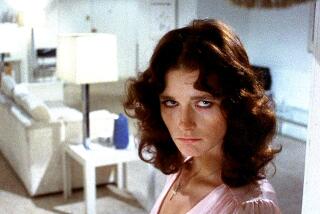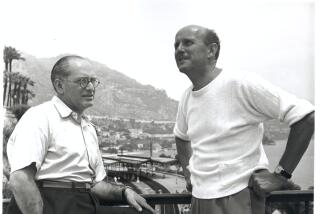Retro : Scorsese’s Significant Four : Republic videos offer director’s picks of films that influenced his career
- Share via
Martin Scorsese, the director of such acclaimed modern-day classics as “Mean Streets,” “Taxi Driver,” “Raging Bull” and “GoodFellas,” loves movies and is a strong advocate of film preservation.
The filmmaker waxes passionately about these topics in the new “Martin Scorsese Presents” video collection recently released by Republic Home Video. Scorsese supplies introductions to four films ($15 each) that inspired his work: “Johnny Guitar,” “Force of Evil,” “Pursued” and “A Double Life.”
Each film has been newly restored, and “Guitar,” “Pursued” and “Double Life” include the original theatrical trailer. Each video also contains a postcard-sized reproduction of the theatrical poster art.
At the beginning of each video, a nattily dressed Scorsese offers a crash course in the film’s history. He discusses each movie’s director, stars, visual style and how it influenced him and other contemporary directors. Seeing the films through Scorsese’s eyes, even for film buffs, is an enlightening experience.
“Johnny Guitar” is an example of a minor film grown to achieve the status of a classic. There is really no other film quite like it.”
*
Scorsese talks about how Nicholas Ray’s psychological 1954 Western, which simmers with sexual overtones, was ignored by American audiences because it didn’t fit the mold of the traditional Western. The European community, especially such New Wave directors as Francois Truffaut, embraced the film and found it highly contemporary.
“Johnny Guitar” stars Joan Crawford at her steely best as Vienna, an enterprising businesswoman who has opened a casino on the outskirts of a small town. Sterling Hayden plays Johnny Guitar, a guitar-slinging, former gunman and Vienna’s old flame. It’s Mercedes McCambridge, though, who steals the film as the insanely powerful woman who wants Vienna dead.
“‘Force of Evil’ has been a major influence on my work ... particularly on ‘Mean Streets,’ ‘Raring Bull’ and ‘GoodFellas.’ ”
*
Scorsese explains that when MGM released this gritty story of two brothers in 1948, most critics dismissed it simply as a gangster movie. Directors such as Scorsese and noted film critics have rediscovered the drama, and last year it was chosen for preservation by the National Film Registry of the Library of Congress for its cultural, historical and aesthetic value.
John Garfield stars as an ambitious Wall Street lawyer in cahoots with a mobster to bankrupt the city’s small-time racketeers. Unfortunately, his brother (Thomas Gomez) is one of the racketeers who is ruined.
Scorsese encourages viewers to listen to the dialogue, which, he says, was written in near-iambic pentameter. “Force of Evil” was written and directed by Abraham Polonsky, who, because of the McCarthy-era blacklist, didn’t make another film until 1969’s “Tell Them Willie Boy Is Here.”
*
“The filmmaking here is some of the most beautiful and purely visual--almost impressionistic--pass a ges to emerge from the Hollywood system.”
Scorsese is talking of the 1947 psychological drama “A Double Life,” which brought veteran actor Ronald Colman his one and only Oscar for his masterful performance as a stage actor who begins to lose his mind while performing a long run of “Othello.”
Directed by George Cukor and written by Ruth Gordon and Garson Kanin, “Double Life” features Shelley Winters in her first major role. Scorsese discusses Cukor’s use of location filming in New York City and the scenes in which Colman’s Anthony John would look out into the audience to illustrate his increasing insanity.
*
“‘Pursued’ is an exceptional picture ... Robert Mitchum’s performance is extraordinary.”
The 1947 “Pursued,” Scorsese says, was the first film noi r Western. Robert Mitchum plays a laconic Civil War hero who is tormented by demons from his past as well as gunfighters pursuing him in the present. Teresa Wright plays his stepsister with whom he falls in love. But after he kills his stepbrother in a gunfight, Wright’s love turns to hate. She marries Mitchum for revenge. Directed with a sturdy hand by Raoul Walsh, “Pursued” was magnificently shot in black and white by James Wong Howe.
More to Read
Only good movies
Get the Indie Focus newsletter, Mark Olsen's weekly guide to the world of cinema.
You may occasionally receive promotional content from the Los Angeles Times.











